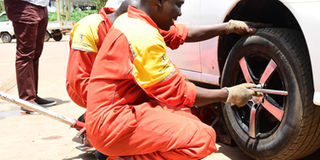Necessary car checks before Easter travels

A mechanic replaces a car tyre. Photo by Edgar R. Batte
What you need to know:
- The resurrection of Jesus should be celebrated and not be ruined by avoidable car malfunctions.
- Follow these precautions and I am sure you will have the best Easter.
Easter is just around the corner and many times individuals or even families prefer to go upcountry or for trips out of town to celebrate with family and friends. This requires many to drive their vehicles that have been doing town rounds for a few miles or kilometres. The journey to an upcountry or distant location is always long and needs a lot of preparation.
Cars, just like humans, need a certain degree of preparing to offer some guarantees over delivering passengers safely. The preparations must align with the distance, road surface and terrain on which one expects to travel.
Ivan Kyeyune, a mechanic on Rubaga Road, says no driver should knowingly drive a journey of more than 40 kilometres without preparing the car.
“It is not necessary that you check the car for defects or faulty mechanical conditions but check to be sure that you will arrive to your destination safely,” he says.
The checks, he says, give the occupants an assurance and informs the driver of any defects and how to navigate them while on the road.
Condition of tyres
According to Ismael Kayondo, a mechanic in Ndeeba, most car accidents result from tyre defects that either go unnoticed or are just ignored.
“Many people drive around with a lump-like protrusion on their tyres and they never care to check what the problem is,” he says, emphasising that any serious driver must make sure that they diagnose the problem and understand where and why there is that protrusion. Beyond this, he says, you must check if the tyres have the right air pressure and if your spare tyre is in perfect shape.
Level of fuel
Unless you are driving an electric car, which is not available in Uganda, you must prepare to take enough fuel to drive you to and from. Be sure that the fuel will sufficiently drive you to your destination in addition to shorter journeys that you might not have prepared for.
Sanyu Male, says she usually fuels her Rav4 with an equivalent of Shs150,000 every time she is travelling to her village five kilometres out of Bulo Town in Gomba District.
“At least I am sure I have enough fuel. Shs100,000 would be enough but I usually put in some additional fuel to enable me visit relatives within or outside the village,” she says.
Oil, water and other fluids
Oil is specifically important here and you must always make sure you have the right quality and quantity.
“You must ascertain that the fluids in your car including different oils, water or coolant levels and brake fluid are sufficient to take you through your journey,” Bogere says.
This can be ascertained at a fueling station, a car service point or a motor garage, he adds.
Shock absorbers
The people who travel upcountry will bear me witness on this one. Up-country roads, especially those that are deep in villages, according to Kyeyune, are usually bumpy and expose cars to a number of mechanical problems.
Therefore, he says, your car needs to have some good ground clearance and well-conditioned shock absorbers to absorb the bumps.
Apart from absorbing bumps, Easter trips are characterised by some form of loading, which might put substantial pressure on the shock absorbers.
Therefore, Kyeyune says, you must always make sure that your shocks are in good shape to withstand such bumpy journeys.
Do not forget these
Here are some extremely useful things to not forget:
• A good torch with extra batteries.
• Your mobile phone and charger.
• The car manual.
• A basic first aid kit.
• Drinking water.
• A windscreen shade.
• Some snacks for the road.
• A basic tool kit for minor repairs.
• A container specifically designed for storing petrol in case you run out.
• Work gloves for handling dirty jobs and car batteries
• A tyre inflation gauge.
• Any medications you should not leave behind.




